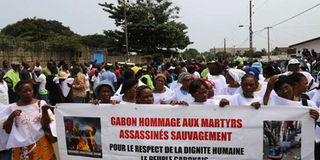Journalist injured amid protests against Bongo

Members of the Gabonese opposition hold a banner reading "Tribute to the martyrs brutally murdered as they demonstrate in Libreville on July 23, 2016. Security forces in Gabon violently charged demonstrators on July 23, 2016, in Libreville in the lead-up to presidential elections and beat an AFP cameraman covering the protest. PHOTO | AFP
What you need to know:
- Defying a heavy police presence, hundreds of protesters took to the streets in opposition to President Ali Bongo Ondimba’s candidacy for re-election on August 26.
- The young protesters broke into song, chanting the national anthem as the security forces began firing tear gas at the crowd.
- Armed, masked members of the security forces grabbed the AFP journalist’s cameraman colleague and threw him onto a pick-up truck, even though his camera was clearly marked.
- Gabon’s Information Minister Alain-Claude Bilie-By-Nze described the incident as “regrettable.”
LIBREVILLE
Security forces in Gabon violently charged at demonstrators gathering on Sunday in Libreville in the lead-up to presidential elections and beat an AFP cameraman covering the protest, a colleague said.
Defying a heavy police presence, hundreds of protesters took to the streets in opposition to President Ali Bongo Ondimba’s candidacy for re-election on August 26, the AFP correspondent said.
Some 15 opposition leaders also attended the protest, forming a human chain at the front of the crowd. Among them was presidential candidate Guy Nzouba Ndama, the former parliamentary speaker.
The young protesters broke into song, chanting the national anthem as the security forces began firing tear gas at the crowd.
Police then moved to break up the protest and several shots were heard, according to the AFP journalist who saw 70-year-old Nzouba Ndama running for cover with other demonstrators.
Armed, masked members of the security forces grabbed the AFP journalist’s cameraman colleague and threw him onto a pick-up truck, even though his camera was clearly marked.
Several officers beat him and then released him minutes later, along with his camera.
Suffering from back pain, the cameraman went to a Libreville hospital for X-rays. AFP’s Global News Director Michele Leridon expressed her “indignation and concern after this attack”, adding that the agency planned to lodge a complaint with the authorities “so that journalists can do their job safely, particularly as the presidential election draws near”.
Gabon’s Information Minister Alain-Claude Bilie-By-Nze described the incident as “regrettable.” “It cannot have happened on instructions from the government,” he said, adding that the security forces had been trained “to protect journalists in demonstrations”.
He suggested that the AFP journalist was picked up because “he was among the demonstrators and wasn’t wearing anything distinctive” to show he was in the media. Two members of the security forces were seriously hurt and 11 demonstrators were arrested, Bilie-By-Nze added.
Nzouba Ndama told AFP that Saturday’s incident “shows Ali Bongo Ondimba is afraid of the opposition speaking its mind.
“They have gone beyond the pale by attacking unarmed citizens.” The UN under-secretary general for political affairs, Jeffrey Feltman, on Friday expressed his “deep concern over the growing tensions in the country” ahead of next month’s election.
STIFLING DEMOCRACY
President Bongo’s father, Omar Bongo Ondimba, ruled the central-western country, a former French colony until it gained independence in 1960, for 41 years until his death in 2009.
During this time, Gabon tapped into the world’s oil boom and its per-capita income rose to four times that of most sub-Saharan African nations. But relatively little of the prosperity has trickled down. Critics accuse the Bongo family of usurping the country’s riches and stifling democracy.
Earlier this month, Gabon’s National Electoral Commission validated the candidature of President Bongo and 13 others vying for the presidency.
“Out of the 13 candidates, there was that of Ali Bongo. There was consensus on the other 13 candidates except that of Ali Bongo. The plenary assembly usually takes decisions based on consensus and when there is no consensus, the vote of the bureau decides.
The electoral commission decided, concerning Ali Bongo’s candidature 5 votes against 3 for the opposition.”
The decision has however been strongly criticised by opposition representatives at the electoral commission who are raising voices that Ali Bongo has changed his birth certificate.
In 2009 his birth certificate number was 65R2/A3 and in 2016 he has used the number 58/R2/A3 NNN. We have noticed that his father’s name has changed from Albert Bernard to El Hadj Omar. The Gabonese constitution states that the country’s leader must be Gabonese by birth.
Ali Bongo’s critics however say he is a Nigerian who was adopted during the Biafran war in the late 1960s. Gabonese opposition party, the National Union on Saturday, called on voters to use the election as way to free themselves from captivity.
Authorities have promised they will not tolerate any activities that would disturb public order. “All those arrested will be tried and jailed. There will be nothing like half-measures. We will just respect the law,” Gabon government spokesman, Claude Bilie said.
Political analysts are showing interest in these developments as they observe the lack of consensus as allies part ways in the battle to grab the presidential seat.
“There is more passion now than in 2009. This passion comes from division which is difficult to be managed with a financially capable oppostion compared to 2009,“political analyst, Dr Modeste Abagha said.
Challengers of Ali Bongo’s candidature have 72 hours to lodge their complaint with the country’s constitutional court.





